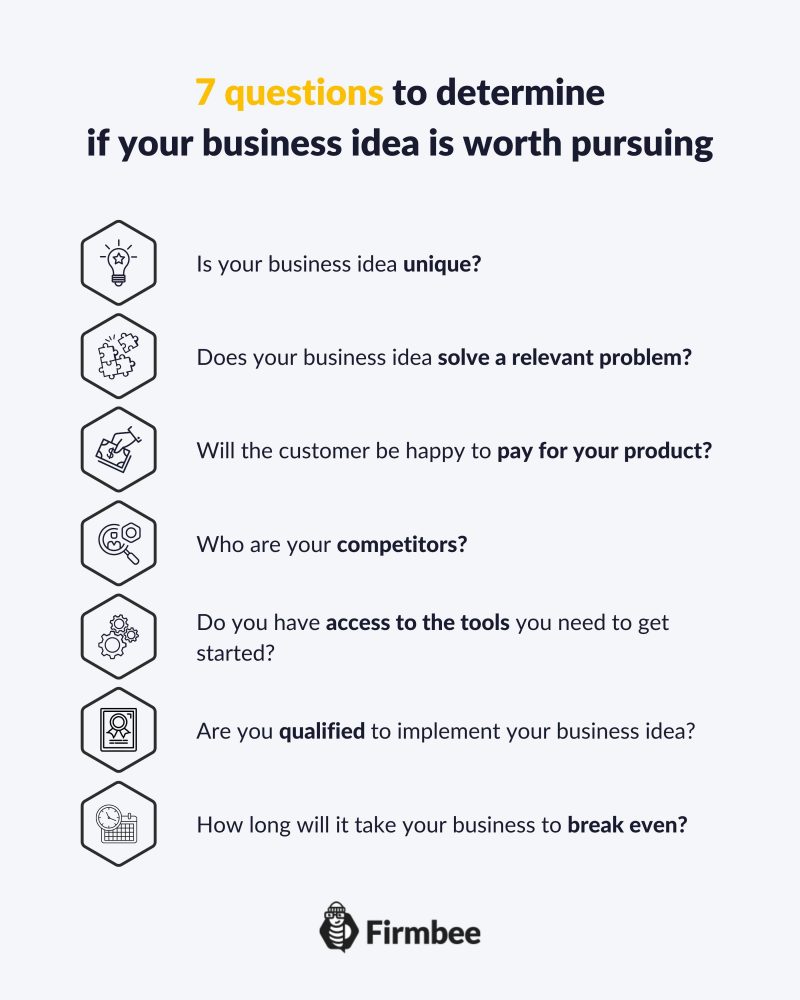Evaluating business ideas can save your time and money. Analyze your business concept and check if it’s worth pursuing. Answering the questions we’ve gathered below should help. Read on.
Business idea – table of contents:
- Is your business idea unique?
- Does your business idea solve a relevant problem?
- Will the customer be happy to pay for your product?
- Who are your competitors?
- Do you have access to the tools you need to get started?
- Are you qualified to implement your business idea?
- How long will it take your business to break even?
Is your business idea unique?
For starters, it’s worth considering whether your business idea is truly unique. It often turns out that many companies are already working on the same or a similar concept simultaneously. Therefore, it might be more difficult for your company to break into the market.
Sometimes, however, it is possible to find your niche even in a highly competitive industry. You should also check whether any other company has already tried to implement a similar idea in the past. If they have, you need to analyze why it has failed to turn into a profitable business.
Does your business idea solve a relevant problem?
A startup must add value to the market and ought to solve a real problem your potential customers face. It would help if you did not confuse a mere inconvenience with a real issue. An inconvenience can be irritating and uncomfortable. Nevertheless, for most people it is perfectly acceptable.
If you’ve already identified the problem and determined that it exists, it’s time to answer the question: does my idea solve it? Make sure that it’s possible to prepare a product that meets your potential customers’ expectations and improves their quality of life.

Will the customer be happy to pay for your product?
The bigger the problem your product or service solves, the higher the profit you can expect from selling it. You can charge more for products and services that provide unique solutions. However, if you are introducing extra functionalities to the existing products or you are addressing the problem from a different angle, you can’t go overboard with the price.
Who are your competitors?
When evaluating the potential of your business idea, you shouldn’t ignore your competition. Identify potential products that can become a threat to your concept and check how your competitors are doing in the market. Will you be able to keep your business afloat? What are the strengths and weaknesses of your competitor’s product and how does your solution compare to that? What changes should you make to give your company a competetive advantage?
Do you have access to the tools you need to get started?
Take time to assess the resources you have at your disposal. Do you have the necessary tools to start a business and develop the product or service you have come up with? If you don’t have all the things you need, will you be able to get them quickly?
Are you qualified to implement your business idea?
Are you the right person to implement the idea? How qualified are you to build a business based on this concept? Although you can easily find people with the relevant qualifications to develop your startup, you should have good business skills in order to be able to critically assess the progress of work on the product and understand the difficulties arising from it. Most highly successful startup founders had the right qualifications to implement their ideas.
How long will it take your business to break even?
Becoming profitable quickly is the goal of any company. Assess how long it might take to get your business idea off the ground. It usually takes two or three years before a new business turns a profit, although it might take longer in some industries. However, if you think that you will reach the break-even point in ten years, perhaps you should search for another business idea.
Want more advice? Check out: What is peer-to-peer feedback?
If you like our content, join our busy bees community on Facebook, Twitter, LinkedIn, Instagram, YouTube, Pinterest.
Author: Andy Nichols
A problem solver with 5 different degrees and endless reserves of motivation. This makes him a perfect Business Owner & Manager. When searching for employees and partners, openness and curiosity of the world are qualities he values the most.
Launch your startup:
- What is a startup?
- Pros and cons of creating a startup
- 8 best industries for startups
- Top 5 skills every highly successful startup founder needs
- How to create a startup? 7 simple and easy steps
- 6 essential startup development stages
- How to create a startup growth strategy?
- General startup statistics you need to know
- Startup vs. corporate job. Which is right for you?
- 5 incredible companies that started in a garage
- How to find a business idea?
- How to check if your startup idea already exists?
- How to name a startup? Useful tips and strategies
- How to gain business knowledge quickly? 5 best practices
- Why do startups fail? 6 startup ideas you should avoid
- 5 weird business ideas that made millions
- Top 6 most profitable small businesses
- 7 questions to determine if your business idea is worth pursuing
- What is a buyer persona? 5 benefits of creating a buyer persona
- How to validate your business idea? 3 easy steps
- Should you follow your passion? The importance of passion in business
- What is market reseach and why is it important?
- Using social media in business
- What to do when you have too many business ideas?
- How to write a good problem statement for your startup?
- How to test your business idea for real?
- How to create a prototype for a product?
- How to build an MVP?
- How to use surveys for testing your business idea?
- 10 useful tools to validate your business idea
- What is a business plan? 4 types of business plans
- What should be included in a business plan?
- What should a product description include?
- Competitor analysis
- Marketing strategy
- Traditional business plan vs. lean startup plan
- Implementation plan. What is it and how to create it?
- Everything you need to know about patents
- Financial management for startups
- What permits and licenses does my startup need?
- What is the average startup founder salary?
- 4 startup taxes you need to pay
- Which legal structure is best for your business?
- Startup costs. How much money will you need?
- Protection of intellectual property in a startup
- Family funding vs. self-funding
- What is a shareholders’ agreement?
- What should a financial section of a business plan include?



















